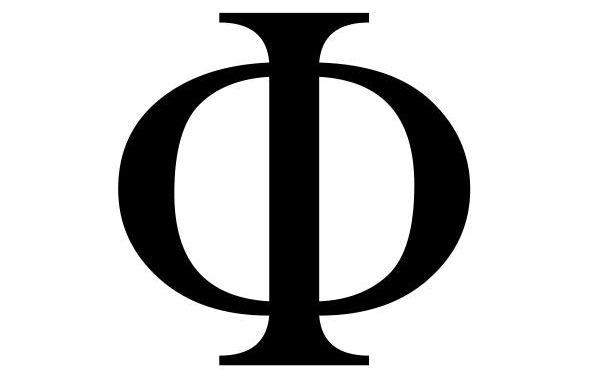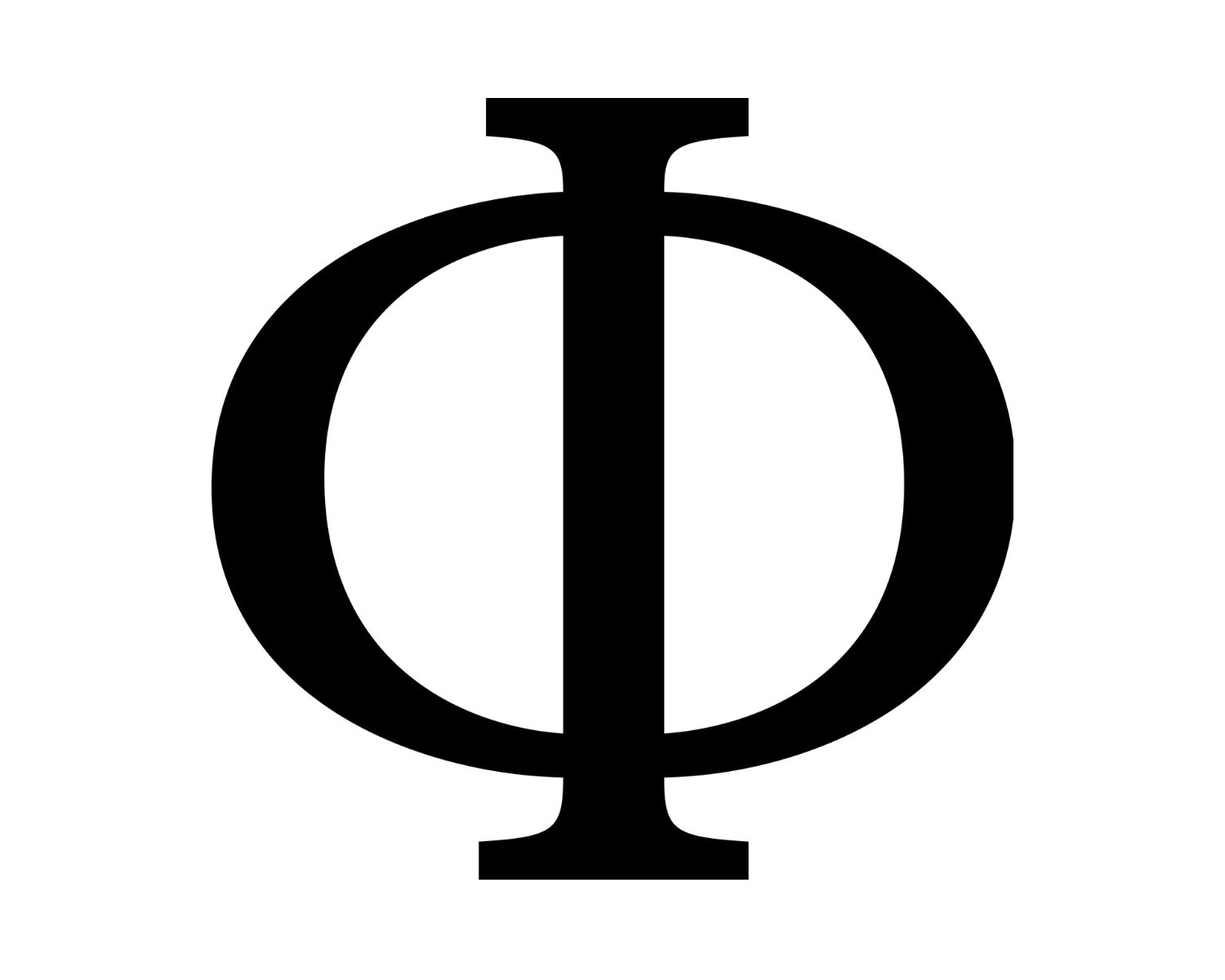Phi's Meanings And Their Presence In Arkansas Life
When you hear the sound "fi," or see that intriguing Greek symbol, it's quite something how many different ideas might pop into your head. It's a sound, a symbol, and a concept that pops up in quite a few surprising spots, more or less, in our daily routines. From ancient numerical puzzles to really serious rules about keeping personal information safe, the idea of "Phi" is a bit more present than you might, say, first guess. It's actually a pretty interesting little bit of our shared human experience, cropping up in places you might not expect, even right here, for instance, in the everyday happenings of folks living in Arkansas.
You know, that twenty-first letter of the Greek writing system, it's pretty versatile, isn't it? It shows up in mathematics, in science, and even as a symbol for groups and organizations. It's a simple mark, yet it carries a lot of different meanings depending on where you see it. We often come across these sorts of symbols and, you know, just take them for granted, but sometimes, it's worth a moment to think about what they truly stand for, or what kind of ideas they represent. It's kind of fascinating, really, how one little symbol can mean so many different things to so many different people.
But there's another side to "Phi," a very important one that has nothing at all to do with numbers or ancient alphabets. This other meaning is all about protecting your personal health details, a topic that's pretty vital for everyone, everywhere, including, say, the people who call Arkansas home. This is the "PHI" that stands for "Protected Health Information," and it's a really big deal in the world of keeping your medical records private and secure. It’s something that touches on everyone's life, more or less, whether you're a patient or someone who helps care for others.
- 1st Studio Siberian Mouse
- Ripped Reiley
- Iran President Vs Supreme Leader
- Lamar Jackson Injury History
- Fiona Gallagher Shameless
Table of Contents
- What's the Story Behind the Greek Letter Phi?
- Unpacking Protected Health Information - What Does PHI Really Mean?
- The Golden Ratio - A Different Kind of Phi
- Protecting Personal Health Details in Arkansas
- Your Rights and PHI - What You Should Know
What's the Story Behind the Greek Letter Phi?
So, you know, the Greek letter Phi, often written as a capital Φ or a smaller φ or ϕ, is a pretty old symbol. People usually say its name like "fy" or "fee," and it's been around for a very long time. It's the twenty-first character in the Greek set of letters, and it used to make a "ph" sound way back in ancient Greek times. That particular sound, apparently, changed to an "f" sound sometime around the first century AD, which is pretty interesting when you think about how languages shift over long stretches of time. It's a simple character, but it has quite a bit of history tied to it, really.
How Does Phi Appear in Everyday Settings, Even in Arkansas?
You might be surprised where this little Greek letter shows up. It's used in lots of different areas, like in the study of numbers, in various scientific fields, and in other places where symbols are needed to represent specific concepts. For instance, when people think about groups or organizations that use Greek letters in their names, perhaps even those found on university campuses or in communities, like those you might find in Arkansas, the letter Phi could very well be a part of that name. It's just a way, you know, for these groups to identify themselves, to carry on traditions, and to connect with a broader, older system of meaning. It's pretty common, actually, to see these letters used in such contexts, giving a sense of heritage and connection to something larger.
Is Phi Just a Letter or Does it Hold Deeper Meanings?
Beyond just being a character in an alphabet, Phi actually has some really unusual mathematical qualities. It's an irrational number, just like Pi, which you might remember from geometry class. But Phi, which is roughly 1.618033988749895, has a lot of unique mathematical properties that have fascinated thinkers for ages. It's often called the "Golden Ratio" because of how often it appears in patterns in nature, in art, and in architecture. It's almost as if this number is woven into the very fabric of how things grow and how things are put together, which is pretty mind-blowing if you stop to consider it. So, no, it's definitely not just a letter; it's a symbol that hints at some very deep and beautiful mathematical relationships, ones that, in a way, seem to govern the world around us.
Unpacking Protected Health Information - What Does PHI Really Mean?
Now, let's switch gears a bit and talk about a completely different, but very important, meaning of "PHI." This isn't about Greek letters or numbers; this is about your personal health details. PHI stands for "Protected Health Information," and it's a really important idea in the world of health care and keeping people's private information safe. It plays a pretty big part, you know, in how medical records are handled and how privacy is maintained for every individual. It’s essentially any bit of information in someone's medical file that could possibly point to who they are, covering things like their health history, what treatments they've had, and even how they've paid for their care. This concept is, quite frankly, a cornerstone of modern healthcare, ensuring that sensitive data is handled with the care it deserves.
Why is Safeguarding PHI so Important for Arkansas Residents?
Keeping PHI safe is incredibly important, not just in theory, but for real people, like those living in Arkansas. The HIPAA Privacy Rule, which is a set of federal guidelines, is there to offer strong protections for your personal health information when it's held by certain health care organizations. This rule also gives individuals a lot of rights concerning their own health data. It means you have a say in who sees your medical details and how they are used. For anyone, whether you're a student, a working professional, or a retired person, say, living in a community in Arkansas, knowing that your health information is protected gives you a real sense of security and control. It's about respecting your privacy and making sure your most personal health stories remain just that: personal.
How Do Rules Around PHI Keep Your Information Safe?
The rules about PHI are pretty clear about what counts as protected information. It's not just your name; it includes things like your birth date, your address, your social security number, and any other piece of information that, when put together, could identify you. This means that health care providers and other related organizations have very specific guidelines they must follow to make sure this information stays private. They have to put policies in place that spell out who inside the organization needs to see your information to do their job, and how that access is managed. It's all about making sure that your health journey, from a simple check-up to a more serious procedure, remains confidential, which, you know, is really what everyone wants when they share such personal details.
The Golden Ratio - A Different Kind of Phi
Let's circle back to the mathematical Phi for a moment, the one that's also known as the Golden Ratio. This number, about 1.618, is truly quite special. It's an irrational number, much like Pi, meaning its decimal places go on forever without repeating. But what makes it so fascinating is how it seems to appear over and over again in natural forms and in things people create. Think about the spiral of a seashell, the arrangement of seeds in a sunflower, or even the proportions in famous works of art and architecture. This ratio seems to create a sense of balance and beauty that is, you know, just naturally pleasing to the eye. It's a pretty remarkable thing to consider, how a simple number can reflect such widespread patterns in the world around us.
Can We See the Golden Ratio's Influence in Arkansas's Natural Beauty?
It's interesting to think about whether we can spot the Golden Ratio's influence in the natural surroundings of a place like Arkansas. When you look at the way leaves grow on a stem, or the branching patterns of trees in the Ozarks, or even the flow of rivers through the landscape, you might, just might, be seeing subtle hints of this mathematical proportion at play. Nature, you know, often follows very efficient and aesthetically pleasing patterns, and the Golden Ratio is a key part of many of those. So, whether you're hiking through a state park or just observing a flower in your garden, you could be witnessing the quiet, underlying order that Phi, the Golden Ratio, helps to describe. It's a way, perhaps, to appreciate the quiet beauty that exists all around us, often without us even realizing it.
Protecting Personal Health Details in Arkansas
Coming back to the serious business of Protected Health Information, it's clear that keeping this data safe is a constant challenge. For anyone involved in providing health care, it can be pretty unsettling to see how often data breaches happen, especially those that target personal health details. It doesn't really matter how big or small a health care provider might be; the risk is always there. This is a very real concern for clinics, hospitals, and even small practices throughout Arkansas, where patient trust is, quite frankly, absolutely vital. Everyone wants to know their medical information is secure, and those who handle it have a significant responsibility to make sure it stays that way.
What Challenges Do Providers in Arkansas Face with PHI?
Health care providers in Arkansas, just like those anywhere else, face a lot of hurdles when it comes to keeping PHI secure. They have to make sure their systems are strong against cyber threats, that their staff are properly trained on privacy rules, and that they have clear procedures for handling patient information. For example, policies and methods must clearly point out which individuals or groups within a health care organization need to have access to this information to perform their duties. This is a crucial step, you know, to limit access only to those who truly need it, reducing the chance of accidental or unauthorized sharing. It's a continuous effort, requiring constant vigilance and updates to their security measures, because, well, the threats are always changing, too.
Your Rights and PHI - What You Should Know
It’s really important for you, as an individual, to understand your rights concerning your own Protected Health Information. The HIPAA rules are designed to give you control over your medical records. For instance, you have the right to get a copy of your health information, to ask for corrections if something is wrong, and to know who has seen your information. There are also specific rules about when your health information can be used or shared for things like future research, and these rules require your permission. You also have the right to change your mind and take back your permission for certain uses or disclosures. We offer information that explains these rights and provides answers to common questions about the HIPAA rules, so you can be, you know, well-informed and feel empowered about your own health data. It’s all about making sure you have a real say in what happens with your very personal health journey.
This discussion has touched on the fascinating dual nature of "Phi," from its ancient origins as a Greek letter and a mathematical constant, the Golden Ratio, to its very modern and critical role as "Protected Health Information" under HIPAA. We've explored how the Greek letter appears in various contexts, including, perhaps, in the names of groups and organizations, and how the Golden Ratio subtly shapes the beauty around us, even in places like Arkansas. More significantly, we've gone over the vital importance of safeguarding personal health details, the rules that govern their protection, and the rights individuals possess concerning their own medical records, emphasizing how these principles are essential for everyone, including the people of Arkansas. It's clear that whether we're talking about a symbol from antiquity or the strict rules of data privacy, the concept of "Phi" carries a lot of weight and relevance in our lives.
- Player 125
- Haircuts For Straight Hair Men
- Many Summers Later Gravity Falls
- Buffstream
- Thanos Actor Age Squid Game

Java : Understanding The Golden Ration Phi | by A Passionate Programmer

11 Facts About Phi - Facts.net

Greek alphabet, letters and symbol